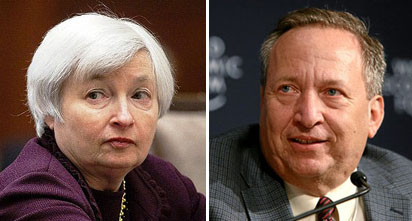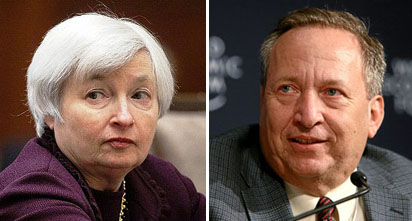
It’s funny: I don’t actually care all that much about whether the next Fed chair is Janet Yellen or Larry Summers, but I do find the debate pretty fascinating. Today, Felix Salmon argues that Summers’ crisis management skills are vastly overrated. Not because Summers doesn’t have good crisis management skills—something I’m a  little skeptical about myself—but for the far more interesting reason that he thinks crisis management skills just don’t matter:
little skeptical about myself—but for the far more interesting reason that he thinks crisis management skills just don’t matter:
The actions of the Fed chair during normal times are of paramount importance: they determine how much growth there is in the economy, how much unemployment there is in the economy, how much the country’s bonds and stocks are worth, and even how likely it is that we might encounter another crisis. The Fed chair is one of the two most important offices in the USA, the other one being the presidency.
That said, however, there’s one time that it doesn’t really matter who the Fed chair is — and that’s when you’re in the midst of a fully-blown financial crisis. At that point, the Fed just moves straight in to Global Firefighter mode….Look, indeed, at what happened in 2008-9: the world’s major central banks all responded in pretty much the same way, and indeed coordinated their actions very effectively. They easily agreed on a system of unlimited swap lines, which provided abundant liquidity, in any currency, in any affected country. Certainly there were stupid decisions made during the crisis, but those stupid decisions were made by finance ministers, not by central bankers.
….In other words, when there’s a crisis, it really doesn’t matter whether you’re Ben Bernanke or Mervyn King or Jean-Claude Trichet — or Janet Yellen or Larry Summers or pretty much anybody else bar Rand Paul. The central banker’s crisis playbook is a thin document, and easy enough for anyone to master. It’s what central bankers do when there isn’t a crisis that matters, since they’re all going to do exactly the same thing when there is one.
Salmon thinks the more important skill isn’t crisis management, but crisis prevention. And on that score, he’s firmly on Team Janet:
Summers has demonstrated essentially zero crisis-prevention skills: his deregulatory instincts helped make the financial crisis more likely and more severe when it happened….As a result, Obama should be bending over backwards to appoint not the candidate who can best manage a financial crisis, but rather the candidate who is most likely to stop a crisis from happening in the first place. That candidate is Janet Yellen.
I don’t really have a considered opinion about this. I certainly agree about Summers’ deregulatory instincts being a problem, but mainly I’m posting this to see what other people think. Is it a common view that when the shit hits the fan, pretty much every competent central banker will do the same thing? Or is Salmon stretching a wee bit too far to find anti-Larry talking points?















